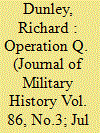|
|
|
Sort Order |
|
|
|
Items / Page
|
|
|
|
|
|
|
| Srl | Item |
| 1 |
ID:
187239


|
|
|
|
|
| Summary/Abstract |
In 1659, a mysterious people, later known as the Westos, attacked the Native American towns of central Georgia and began enslaving those it captured. These assaults marked the beginning of two decades in which Westo slave raids terrorized the region and helped trigger massive changes in the socio-political landscape of the Deep South. Yet little is known about the Westos’ initial forays into the area, and why they were so successful. Most scholars believe their success hinged on their acquisition and use of firearms against bow-and-arrow cultures. This essay argues for a more nuanced and realistic interpretation of Westo power as demonstrated by the route they used to access the Deep South, the types of weapons available to them, the tactics they used, and ultimately, how the indigenous people of region interpreted the Westos’ presence.
|
|
|
|
|
|
|
|
|
|
|
|
|
|
|
|
| 2 |
ID:
187241


|
|
|
|
|
| Summary/Abstract |
The historiography of U. S. Grant’s 1863 Vicksburg Campaign is extensive. Numerous tactical studies dissect in detail unit movements, strategy, and the intricacies of the siege leading to the fall of Vicksburg. Much of the campaign’s logistics remain largely untreated. This study assesses the impact of environmental conditions on complex logistical operations and how those conditions constrained battle plans, dictated command decisions, and determined tactics, given the limitations of Civil War technology. Primary focus is on Grant’s land campaign from Bruinsburg Landing to the initiation of the siege of Vicksburg. A shift from a combat operations-based to a science-based paradigm synergizes battlefield weather conditions, terrain limitations, physical properties of soils traversed by an animal-dependent army on the move, and the impact of geology on trafficability and sources of potable water, offering a new understanding of what many consider the most important campaign of the Civil War.
|
|
|
|
|
|
|
|
|
|
|
|
|
|
|
|
| 3 |
ID:
187242


|
|
|
|
|
| Summary/Abstract |
British strategy during the First World War has long been a contentious issue, and whether the nation’s sea power could have been used to greater effect lies at the heart of the debate. This article presents new evidence to show that both Winston Churchill and Admiral Lord Fisher, the key figures in the Admiralty in the opening year of the war, focused on implementing a naval offensive against Germany throughout their time in office. The first stages of this operation came within hours of execution in May 1915. This revelation sheds new light on the wider British strategic approach and on the significance of the fall of the Fisher-Churchill regime for Britain’s grand strategy.
|
|
|
|
|
|
|
|
|
|
|
|
|
|
|
|
| 4 |
ID:
187240


|
|
|
|
|
| Summary/Abstract |
The Russian Imperial Baltic Fleet founded by Peter I (the Great) of Russia suffered serious neglect after his death, and Russian grand strategy had to be revised to avoid deploying it in naval combat. During the Seven Years' War, the fleet played a minor, supporting role in coastal cruising and landing troops; its most significant accomplishment was supporting the siege of Kolberg. Upon her accession in 1762, Empress Catherine II (the Great) embraced administrative and training reforms that significantly improved the fleet's operational effectiveness, which was first demonstrated in the Aegean Expedition of 1769–1774.
|
|
|
|
|
|
|
|
|
|
|
|
|
|
|
|
| 5 |
ID:
187244


|
|
|
|
|
| Summary/Abstract |
Russian and Soviet military theorist Aleksandr Svechin developed his theory of military art based on the two cornerstone concepts: annihilation and attrition. Yet these concepts frequently have been misunderstood by his critics, who demoted them from the strategic to the operational level. A close examination of Svechin’s legacy allows reinstating annihilation and attrition as characterizations of the overall dynamics of war rather than mere styles of warfare freely adopted by a given belligerent. When viewed in the context of operational/strategic distinction, moreover, the Soviet theorist's concepts remain as important and practically applicable today as they were in the early 20th century.
|
|
|
|
|
|
|
|
|
|
|
|
|
|
|
|
| 6 |
ID:
187243


|
|
|
|
|
| Summary/Abstract |
In the 1960s, Australia’s commitment to collective security and its grand strategy of forward defense spurred its intervention in Vietnam. As British and American allies signaled retreat from Southeast Asia in 1968–1969, Prime Minister John Gorton sought to encourage U.S. resolve by keeping Australian forces there. With more American soldiers coming home under the guise of Vietnamization, the Australian public increasingly demanded troop withdrawals. The political facts of life became paramount, with Gorton’s government buckling in 1970. This article explains the military, strategic, diplomatic, and political considerations that produced Canberra’s decision to begin troop reductions in Vietnam.
|
|
|
|
|
|
|
|
|
|
|
|
|
|
|
|
|
|
|
|
|